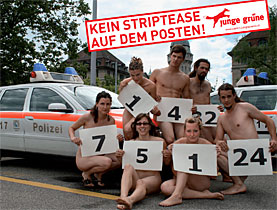Move to ban pollutant cars gathers pace

Voters are likely to have the final say on a proposal to ban the top polluting cars from Swiss roads.
The youth wing of the Green Party has gathered 130,000 signatures for a people’s initiative to be lodged with the federal authorities, a party spokesman said on Monday.
The group wants to outlaw vehicles such as sports utility vehicles (SUVs) that may emit excessive quantities of harmful substances, particularly carbon dioxide or fine-particles or those whose size and frame pose an extra danger to pedestrians, cyclists or other road users.
But the Swiss automobile importers association describes the initiative as “unfortunate”, saying the 250g CO2/km limit it calls for would affect not just off-road vehicles, but also family cars.
Sales of the highest emitters are not as significant as in other countries, the association also notes.
“Light trucks and SUVs are popular in the United States and dominate the market. This is not the case here, especially for light trucks. So I don’t think we will see the same effects here,” Andreas Burgener of Auto Schweiz told swissinfo.
The Young Greens launched the emission-curbing initiative, For Vehicles More Respectful of People, in 2007. It has been signed by people of all ages from around the country, whose identities are now being checked locally before the project is lodged with the chancellery next month.
Changing attitudes
Bastien Girod, Green Party parliamentarian and member of the project coordinating committee told swissinfo the response so far was encouraging.
“It is certainly nice to see that the Swiss population recognises that there is a problem and therefore is helping to collect enough signatures to get it changed.
“I think that we have a good chance that we can pass with this initiative because the thinking is changing and people are realising that we have to act against climate change. SUVs are really obviously something we cannot afford to buy anymore.”
He said the project also was a success insofar as the Young Greens had shown they could get sufficient signatures for the issue and demand a national vote on a subject they felt was important for their future.
“What we are actually asking for is a limit on CO2 emissions. With this criteria we will affect the SUVs because they have very high emissions.
“But we have also foreseen that there are exceptions for people who really need big cars like farmers or people who are working in forests. It’s not completely banning, it’s making stricter environmental norms.”
The Young Greens say their initiative would help address global warming, cut down on air pollution, favour fuel-efficient cars and reduce the risk of road injuries to cyclists and pedestrians that can be caused by impacting with the high, tough exteriors of four-wheel drive vehicles.

More
People’s initiative
Debate needed
Auto Schweiz says four-wheel drive cars represent about 24 per cent of the Swiss car market – half of which are SUVs.
“In Switzerland and Europe, people tend to choose smaller models. What we have seen is people choosing diesel engines over petrol ones, and this makes sense as diesel engines are highly efficient.
“Clients react to fuel prices. Sales of vehicles with larger engines might drop somewhat,” he added.
He argues the situation still needs further debate in Switzerland.
“Once the initiative is handed in, discussions about 4×4 vehicles will begin. It is not something we will take lightly,” Burgener concluded.
swissinfo, Jessica Dacey and Scott Capper
The Young Green initiative states:
Vehicles that emit excessive quantities of harmful substances, in particular CO2 or fine-particles, must not be registered. The government is to set emission limits applicable to different categories of vehicles.
Vehicles that pose an excessive danger for cyclists, pedestrians or other road users must not be registered. The government it to issue appropriate guidelines on to different categories of vehicles.
The government must regularly adapt guidelines and emission limits.
The government allows for exceptions relevant to the utilisation and registration of above-mentioned vehicles that are essential for certain activities.
A survey in April 2008 by the gfs.berne research institute found that 80% of the Swiss population realised cars had a negative impact on the environment – a 9% increase on a similar poll in 2005.
Two-thirds of those questioned said they could imagine buying a less-polluting car in future, and 88% favoured financial incentives to encourage purchases of green vehicles.
A large majority said they thought the automobile industry was not doing enough to reduce CO2 emissions.
The poll found that every second person sits behind the wheel of his or her car at least once a day and 60% drive more than 100km a week. Both of these figures were down slightly compared to the 2005 survey.

In compliance with the JTI standards
More: SWI swissinfo.ch certified by the Journalism Trust Initiative











You can find an overview of ongoing debates with our journalists here . Please join us!
If you want to start a conversation about a topic raised in this article or want to report factual errors, email us at english@swissinfo.ch.